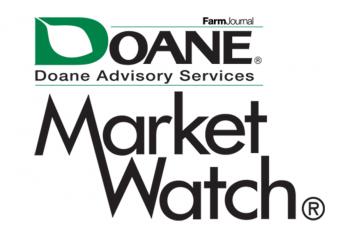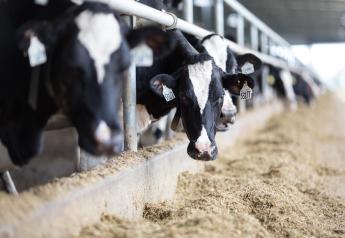Senate Passes $3.5 Trillion Budget Blueprint, but Sen. Manchin Issues Warning

Inflation settles at high rate as prices leap 5.4% from a year ago
In Today’s Digital Newspaper
Market Focus:
• U.S. inflation remains at 13-year high in July|•
• Republican strategy re: debt ceiling
• Chicago Fed’s Evans wants more data before tapering bond buys
• White House urges OPEC to boost oil production amid Covid-19 recovery
• Canada’s railroads racing each other to consolidate North American freight rail sector
• Maersk Line having trouble finding enough of the used cooking oil it needs
• USDA daily export sale: 132,000 MT soybeans to China during 2021-2022
• Ag demand update
• Soybeans climb ahead of USDA’s reports Thursday
• Stifling summer heat stretches from coast to coast
• Heat and dryness remain problematic in Canada
• Argentine soybean sales running just ahead of last season
• Beef prices have marched higher for 14 straight days
• Hogs remain under pressure
Policy Focus:
• Senate Democrats adopt sweeping $3.5 trillion budget blueprint
• Senate as expected passes bipartisan infrastructure bill
• 19 GOP senators who helped pass infrastructure bill
• Key ag provisions in Senate vote-a-rama
• Democrats on Senate Ag panel meeting privately to start carving up $135 billion
• Chart by Republicans on Senate Ag panel shows impact of $135 billion in spending
Biden Administration Personnel:
• Biden announced selections of two more deputies at USTR
• Senate confirms Moffitt to USDA post
• USDA nominees Bonnie and Torres Small cleared for Senate vote
• EPA nominees’ hearing reset for Sept. 15
China Update:
• Chinese court sentenced Canadian entrepreneur to 11 years in prison
• Delta variant threatening China’s economic recovery
Trade Policy:
• Meat plants cleared to resume shipments to Mexico
Energy & Climate Change:
• Republicans urge Biden to oppose European Union carbon tariffs
• Judge gives Interior until Aug. 24 to respond on oil, gas lease issue
• Mandate to report?
Livestock, Food & Beverage Industry Update:
• Food supply chains getting whipsawed changing direction of pandemic recovery
• Poultry merger draws Grassley scrutiny
• USDA to host food waste roundtable Sept. 15
Coronavirus Update:
• Fauci: Covid can further mutate among those that are unvaccinated
• Final Covid-19 wave?
Politics & Elections:
• Independents cooling on Biden spells trouble for Democrats in 2022
• Cuomo announces resignation in aftermath of sexual harassment report
• Rep. Ron Kind, a conservative Democrat, says he won’t seek re-election
• Texas Republicans authorize potential arrest of Dems who left state to block voting bill
• Dominion wages war on far-right news media over disinformation
Congress:
• House Majority Leader Steny Hoyer announced members will return from recess Aug. 23
Other Items of Note:
• White population declines
• U.S. Postal Service is adding surcharges again
MARKET FOCUS
Equities today: Global stock markets were mixed overnight, with European indexes at or near record highs and Asian shares a bit weaker. The Dow rose 100 points following the latest inflation report update.
U.S. equities yesterday: The Dow rose 162.82 points, 0.46%, at 35,264.67. The Nasdaq fell 72.09 points, 0.49%, at 14,788.09. The S&P 500 was up 4.40 points, 0.10%, at 4,436.75.
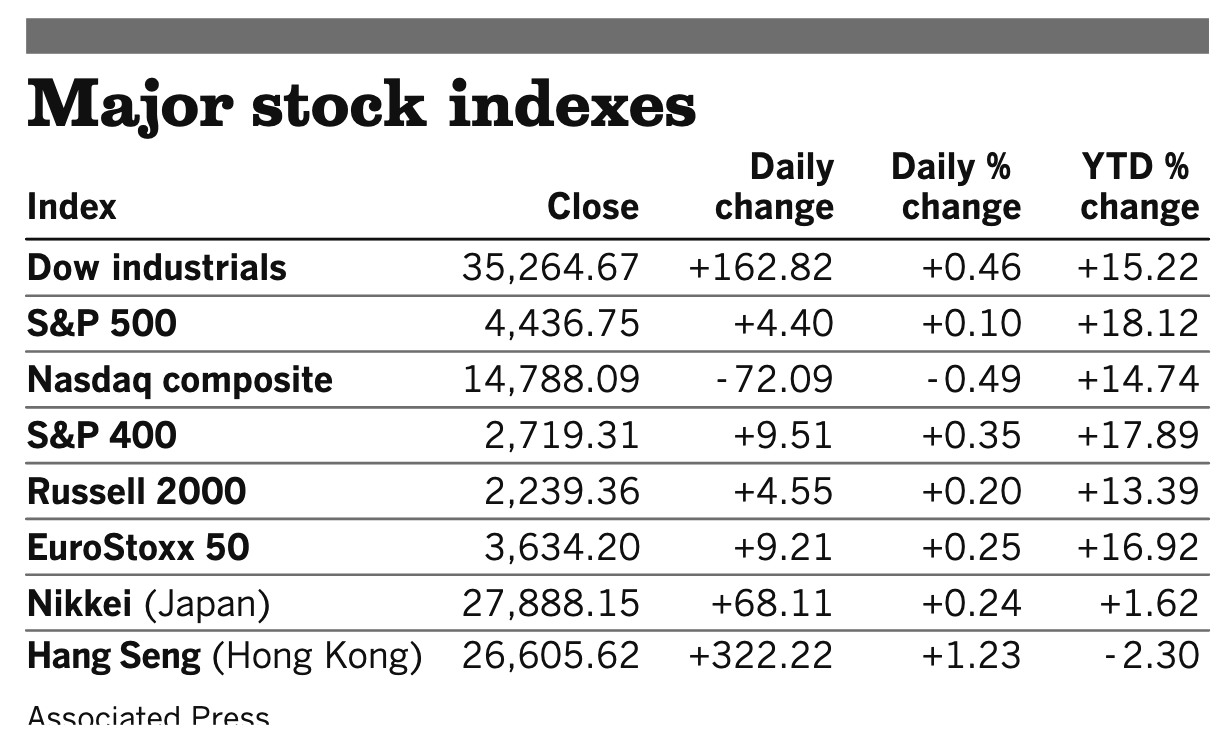
On tap today:
• U.S. consumer price index for July is expected to increase 0.5% from a month earlier and 5.3% from a year earlier. Excluding food and energy, the CPI is forecast to increase 0.4% and 4.4%. (8:30 a.m. ET) Update: The Labor Department reported that its consumer price index rose 5.4% in July from a year earlier, the same pace as in June and the highest 12-month rate since 2008. The CPI climbed a seasonally adjusted 0.5% in July from June, a slightly cooler pace than its 0.9% increase in June from May. The so-called core price index, which excludes the often-volatile categories of food and energy, increased 4.3% from a year before. The inflation rate wipes out the wage gains seen over the past year.
• Kansas City Fed President Esther George speaks on the economy and monetary policy at 12 p.m. ET.
• U.S. federal spending and revenue figures for July are out at 2 p.m. ET.
• President Biden will meet today with business leaders and a university president, seeking to encourage other employers to follow their lead and require Covid-19 vaccines for workers.
Republican strategy re: debt ceiling. All but four Republican senators have signed on to a pledge to force Democrats to raise the debt ceiling through procedures that don’t rely on GOP votes, escalating the political tug of war over who is responsible for keeping the U.S. from defaulting, the Wall Street Journal reports (link). Raising the debt limit doesn’t authorize new spending, but rather allows the Treasury Department to issue new debt to cover spending that Congress has already authorized, including payments to bondholders, Social Security recipients, veterans and others.
A Wall Street Journal editorial (link) says House Speaker Pelosi fears she lacks the votes in the House, so she’s jamming the GOP.
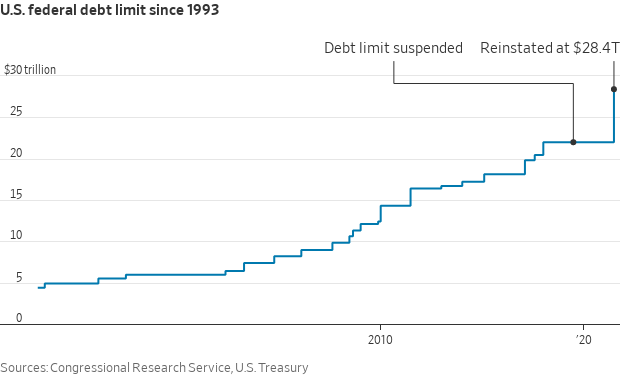
Chicago Fed’s Evans wants more data before tapering bond buys. Current Federal Open Market Committee (FOMC) voter Chicago Fed President Charles Evans said Tuesday he wants to see more jobs data before the Fed opts to adjust monetary policy and start tapering its bond purchases that have been taking place at $120 billion per month. He expected the conditions for tapering the bond buys will be met “later this year,” noting that whether it is September, November, December or January will not have an “important effect.” As for inflation, Evans still believes current price pressures will be temporary, but said the price increases are challenging for consumers and businesses. “There is not sugar-coating the pain,” he remarked. But he said the Fed needed to follow their framework adopted last year to prove it is serious about reaching maximum employment and inflation averaging 2% over time. "We should not preemptively end a strong improvement in the labor market because somebody is getting nervous about inflation," Evans said. "I am going to be very regretful if we sort of claim victory on averaging 2% and then find ourselves in 2023 with about a 1.8% inflation rate ... That would be a challenge for our long run framework." Evans’ view makes clear there is not yet a unified view on the U.S. central bank for timing on adjusting U.S. monetary policy yet, or at least not a unified view that tapering the bond purchases needs to take place soon.
Market perspectives:
• Outside markets: The U.S. dollar index was slightly higher ahead of U.S. inflation data as both the euro and British pound were weaker against the U.S. currency. The yield on the 10-year U.S. Treasury note was firmer ahead of U.S. economic updates, trading around 1.36%. Gold and silver futures were higher ahead of U.S. inflation data, with gold trading around $1,738 per troy ounce and silver around $23.40 per troy ounce.
• Crude oil futures are under pressure ahead of U.S. gov’t inventory data, with U.S. crude trading around $67.40 per barrel and Brent around $69.75 per barrel. Crude was weaker in Asian action, with U.S. crude down 13 cents at $68.16 per barrel and Brent down 12 cents at $70.51 per barrel.
• White House urges OPEC to boost oil production amid Covid-19 recovery. Recent planned increases by OPEC won’t fully offset previous cuts, National Security Adviser Jake Sullivan said. Sullivan said in a statement that recent planned production increases by OPEC would “not fully offset previous production cuts” made by OPEC and its oil-producing allies during the pandemic. “At a critical moment in the global recovery, this is simply not enough,” Sullivan said.
• Canada’s two big railroads are racing each other in a bid to consolidate the North American freight rail sector. Federal regulators plan to issue a key ruling by the end of the month that would potentially clear the way for Canadian National Railway $30 billion acquisition of Kansas City Southern, the WSJ reports (link), even as Canadian Pacific Railway is trying to get back into the picture with an increased offer to acquire the U.S. carrier. The Surface Transportation Board (STB) is considering Canadian National’s bid to create a voting trust for its purchase, a critical step in the acquisition process. The STB’s timeline means Kansas City Southern shareholders may vote next week without clear indication of whether the STB will bless the deal. Canadian Pacific is trying to jump in ahead of that regulatory action with a proposal worth around $27 billion (link), still short of its rival’s offer.
• Maersk Line is having trouble finding enough of the used cooking oil it needs for its carbon-neutral strategy. Link to more via Bloomberg.
• Ag demand: A group of importers in Thailand issued an international tender to buy up to 139,500 MT of animal feed wheat. South Korea’s Major Feedmill Group issued an international tender to buy up to 210,000 MT of animal feed corn. Importers in the Philippines tendered to buy up to 120,000 MT of wheat and 120,000 MT of animal feed barley.
• USDA daily export sale: 132,000 MT soybeans to China during 2021-2022 marketing year.
• NWS weather: Stifling summer heat to stretch from coast-to-coast; searing heat takes shape across the Pacific Northwest while sultry conditions persist across the Northeast/Mid-Atlantic and the mid-section of the country... ...Daily rounds of strong-to-severe storms across the Great Lakes and northern Mid-Atlantic... ...Poor air quality due to wildfire smoke continues in the western and central U.S., monsoon showers and storms to drench parts of the Southwest, watching Tropical Storm Fred late week.
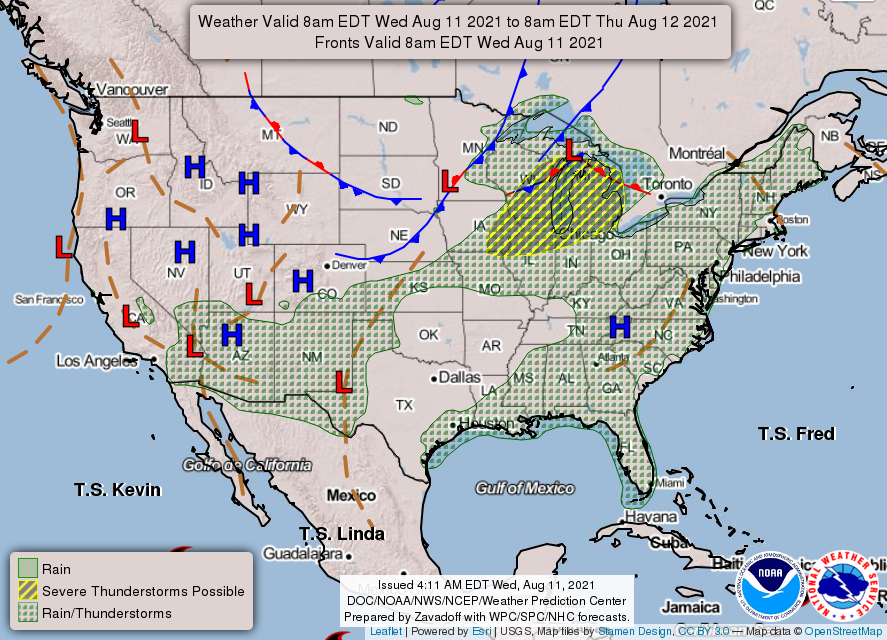
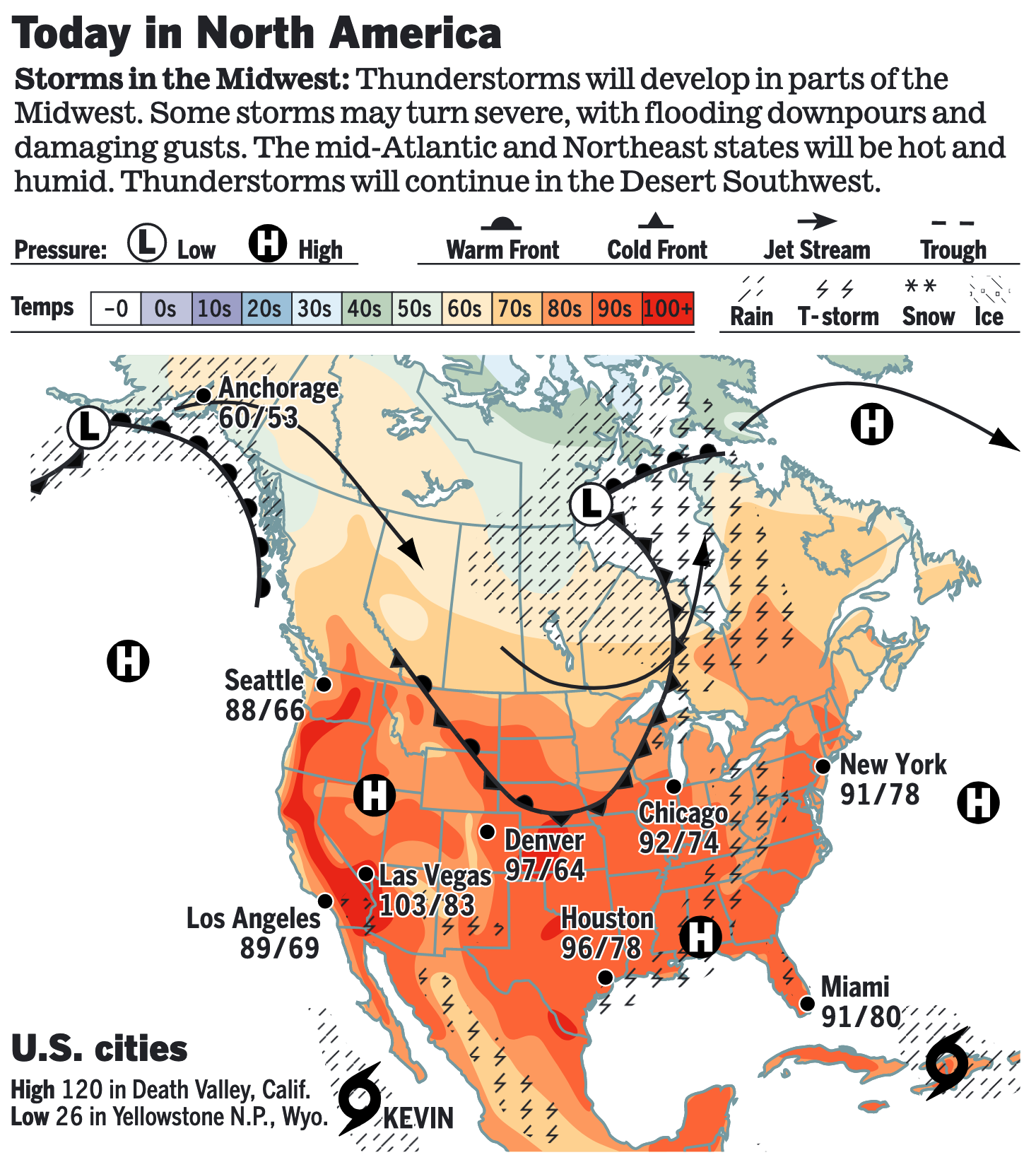
Items in Pro Farmer's First Thing Today include:
• Soybeans climb ahead of USDA’s reports Thursday
• Stifling summer heat stretches from coast to coast
• Heat and dryness remain problematic in Canada
• Argentine soybean sales running just ahead of last season
• Beef prices have marched higher for 14 straight days
• Hogs remain under pressure
POLICY FOCUS
— Democrats take initial step toward $3.5 trillion spending plan later this year without GOP support. The Senate voted 50-49 to take up a budget resolution that includes instructions on how to draft the spending package and greenlights it to bypass the 60-vote filibuster this fall. No Republicans voted for the budget framework but just before 4 a.m. ET, the Senate passed the $3.5 trillion budget blueprint.
Problems ahead. Sen. Kyrsten Sinema (D-Ariz.) has warned that she can’t support a bill with a $3.5 trillion price tag and Sen. Joe Manchin (D-W.Va.) has expressed concerns about the debt. Manchin sent another warning shot to President Biden and congressional leaders, saying he has "serious concerns" about spending $3.5 trillion on a massive package that Democrats want to pass later this year. Manchin said in a statement early today that he has "serious concerns about the grave consequences ... if Congress decides to spend another $3.5 trillion… Given the current state of the economic recovery, it is simply irresponsible to continue spending at levels more suited to respond to a Great Depression or Great Recession – not an economy that is on the verge of overheating," Manchin said.
McConnell blasted the massive spending package. “They call it $3.5 trillion in spending, nonpartisan experts say those plans would more likely cost Americans about $5.5 trillion. Trillions more borrowing and trillions more spending when inflation is already sticking American families with higher costs,” Senate Minority Leader Mitch McConnell (R-Ky.) said Monday. “New permanent welfare with no work requirements when small businesses are already struggling to find workers. Sweeping amnesty when the southern border is already in a crisis. Green New Deal regulations when Americans’ gas prices have already shot up, crushing tax hikes for family businesses and farms as they fight to recover from the recession.”
— Senate as expected passes bipartisan infrastructure bill, providing the largest infusion of new federal aid into infrastructure projects in a more than a decade. The Senate Tuesday morning passed a $1 trillion infrastructure package ($550 new funding) after months of negotiations and days of floor debate, sending the bill to the House, where Democrats say they’ll consider it in September alongside a much larger bill that would pay for a broad array of social and climate mitigation programs. The vote was 69-30. In all, 19 Republicans joined all Democrats in voting for Senate passage.
The following 19 GOP senators helped pass the deal:
- Roy Blunt (Mo.)
- Richard Burr (N.C.)
- Shelley Moore Capito (W.Va.)
- Bill Cassidy (La.)
- Susan Collins (Maine)
- Kevin Cramer (N.D.)
- Mike Crapo (Idaho)
- Deb Fischer (Neb.)
- Lindsey Graham (S.C.)
- Chuck Grassley (Iowa)
- John Hoeven (N.D.)
- Mitch McConnell (Ky.)
- Lisa Murkowski (Alaska)
- Rob Portman (Ohio)
- James Risch (Idaho)
- Mitt Romney (Utah)
- Dan Sullivan (Alaska)
- Thom Tillis (N.C.)
- Roger Wicker (Miss.)
The measure includes $550 billion in new spending, with $110 billion set to be allocated toward roads, bridges and other projects; $65 billion toward broadband, $66 billion to be spent on passenger and freight rail, $55 billion for water infrastructure, $39.2 billion for public transit, $47.2 billion for resiliency purposes, $7.5 billion for electric vehicle infrastructure and $21 billion to address pollution. Link to NYT item that includes some nifty graphics.
Perspective: The new spending is roughly equivalent to the cost of the Interstate Highway System, after adjusting for inflation.
House agenda. House Speaker Nancy Pelosi (D-Calif.) said the House would not take up the bipartisan bill without the passage of the budget that sets the guidelines for them to move on the $3.5 trillion bill. But…
House to cut recess short, take up Democratic budget plan. The House will interrupt its previously scheduled seven-week summer recess later this month to consider a budget resolution to kick off the process for Democrats' $3.5 trillion spending plan. House Majority Leader Steny Hoyer (D-Md.) announced in a letter to lawmakers on Tuesday that the chamber will return to session on Aug. 23 to consider the budget resolution.
As for the House and the physical infrastructure bill, tweaks are expected. Then the House and Senate will hash out their differences before sending a final bill to President Biden, provided House Dems do not make draconian changes that would derail the process in a coming second Senate vote.
Bottom line: Pelosi, by denying the bipartisan bill a House vote until the Senate approves the larger bill, is looking to satisfy far-left liberals in her caucus. The strategy is also an effort to maintain some leverage over moderate Democratic senators, who are invested in the bipartisan bill, in the hopes of preventing them from watering down the larger package. Asked about the legislative maneuvering required to pass both bills, President Biden expressed optimism that the Senate would eventually pass “a significant portion, if not all” of the proposed budget bill. “I think we will get enough Democrats to vote for it,” he said. “And I think the House will eventually put two bills on my desk.”
— Key ag provisions in Senate vote-a-rama. The Senate held a 15-hour “vote-a-rama,” a nonstop string of messaging amendments that resulted in 40 roll calls by the time the measure was approved at around 4 a.m. ET.
Note: The amendments are non-binding since the budget resolution does not become law. But it is a sign of where the Senate majority lands on an issue and as noted below, the Senate made it clear that it does not support the changes in stepped up basis nor Clean Air Act regs on farmers and ranchers among other things. Said one contact: “Democrats are going to have a very tough time passing their reconciliation bill and they will lose by winning if they manage to.” With the budget resolution mostly advisory, the goal of most amendments was actually to force the other party’s vulnerable senators to cast troublesome votes that can be used against them in next year’s elections for congressional control.
- Sen. John Thune (R-S.D.) amendment calling for “preserving” current tax rules for transferring farms and businesses, including the “full benefit of the step-up in basis for assets acquired from a decedent.” The amendment, which is non-binding, was adopted on a 99-0 vote. President Biden’s proposal would allow producers to defer the tax liability on inherited assets as long as the farms stay in operation. Thune said the amendment "would provide permanent relief by preserving step-up in basis for all family owned businesses, farms and ranches.”
- Sen. Joni Ernst (R-Iowa) amendment based on Thune bill passed to exempt farmers and ranchers from Clean Air Act regs. The amendment would block any U.S. government attempt to require methane emission permits for livestock producers was adopted 66-33. "Our hardworking livestock producers should not have to worry about being subject to onerous regulations and increased production costs due to the federal permits or regulations," Ernst said. Senate Environment and Public Works Committee Chairman Tom Carper (D-Del.) said the amendment wrongly implied that the Environmental Protection Agency was considering new regulations on farms.
- An amendment from Senate Agriculture Committee Ranking Member John Boozman (R-Ark.) was approved, 53-46, that would prohibit USDA from pulling back federal dollars from rural electric providers to generate power from fossil fuels.
Republicans gloated after Democrats opposed GOP amendments calling for the reopening of pandemic-shuttered schools, boosting the Pentagon’s budget and retaining limits on federal income tax deductions for state and local levies. They also were pleased when Democrats showed support for the president’s now-suspended ban on oil and gas leasing on federal lands, which Republicans said would lead to gas price hikes. Some Democrats voted for a measure to prohibit a fracking ban.
One amendment may have backfired after the Senate voted 99-0 for a proposal by Republican Sen. Tommy Tuberville of Alabama to curb federal funds for any municipalities that defund police. That idea has been rejected by all but the most liberal Democrats, but Republicans have accused them anyway of backing it. Sen. Cory Booker (D-N.J.) called the freshman Republican’s amendment “a gift” that would let Democrats “put to bed this scurrilous accusation that somebody in this great esteemed body would want to defund the police.”
Republicans claimed two narrow victories with possible implications for future votes, with Democratic Sen. Joe Manchin of West Virginia joining them on both nonbinding amendments. One indicated support for health care providers who refuse to participate in abortions and the other voiced opposition to teaching critical race theory, which considers racism endemic to American institutions.
— Democrats on the Senate Ag panel began meeting privately to start carving up $135 billion in new spending that would be authorized by the budget resolution. "We're going to continue to have conversations and make sure that people both on and off the committee have a chance to express themselves," Chairwoman Debbie Stabenow (D-Mich.) told reporters Tuesday. Here is how Republicans on the Senate Ag Committee view the $135 billion in spending:
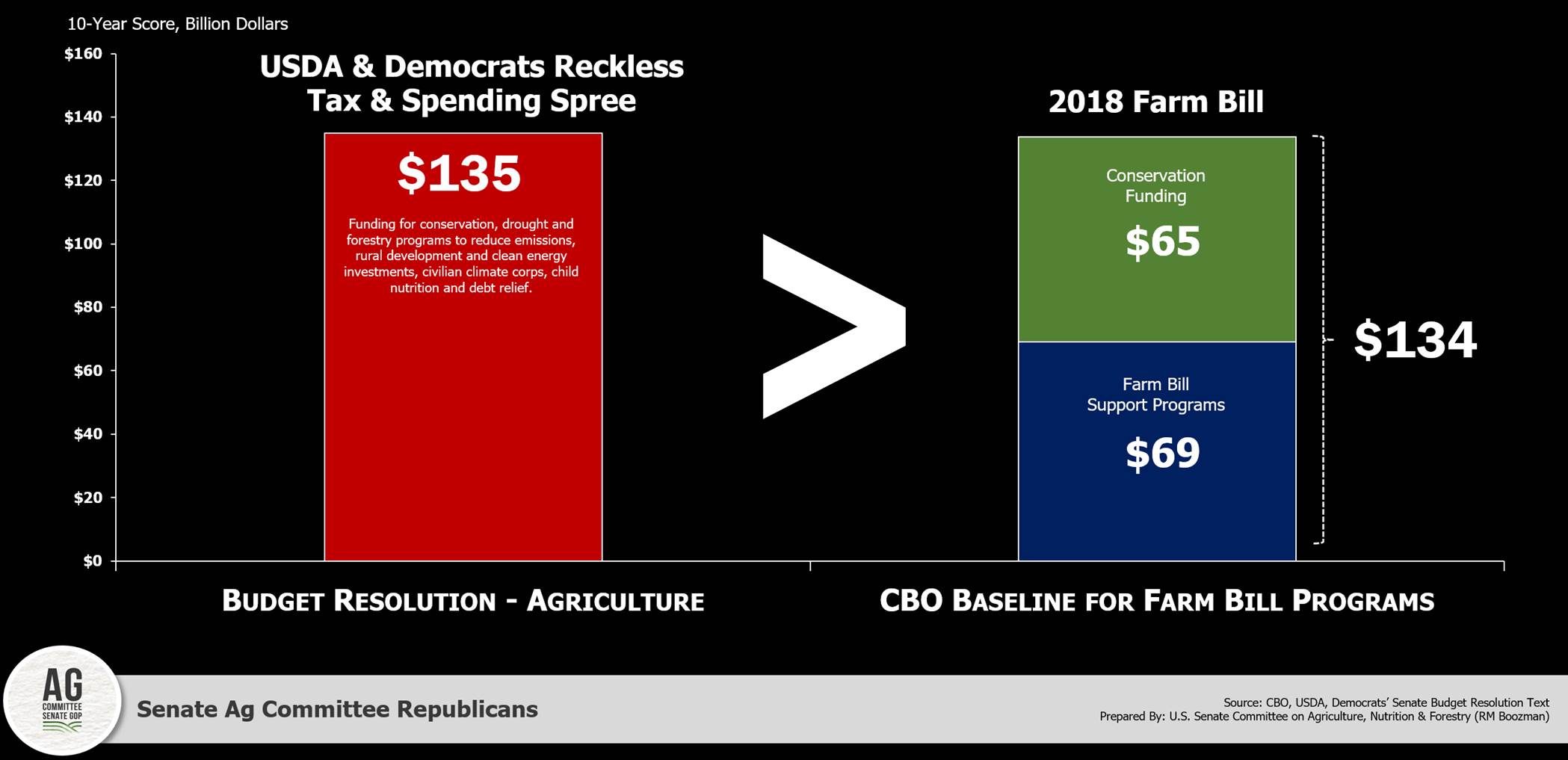
— Schumer outlines $107 billion plan for legal status for immigrants as part of massive Democratic spending bill. Senate Majority Leader Chuck Schumer (D-N.Y.) detailed plans for Democrats to pass legislation to give legal status to some immigrants illegally residing in the United States and to fund border security improvements. Schumer included the measures in Senate Democrats' fiscal year 2022 budget. The plan calls for providing lawful permanent status to an unspecified number of illegal immigrants and "smart and effective" border security measures. The budget does envision new spending on unspecified border management programs. Democrats oppose physical barriers at the southern border, where more migrants are illegally crossing in recent months than any time in the past 21 years. "We are carefully coordinating our work on the budget with our House colleagues," Schumer said in a statement.
BIDEN ADMINISTRATION PERSONNEL
— President Biden announced selections of two more deputies at the Office of the U.S. Trade Representative, but not the top agriculture negotiator. María Pagán was named to deputy for World Trade Organization affairs in Geneva and Christopher Wilson was tapped to be the agency’s chief innovation and intellectual property negotiator.
— Senate confirms Moffitt to USDA post. The Senate approved the nomination of Jennifer Moffitt to be USDA undersecretary for marketing and regulatory programs.
— Senate Agriculture Committee approves USDA nominees. After a one-day delay, the Senate Agriculture panel approved the nominations of Robert Bonnie to be USDA undersecretary for farm production and conservation and Xochitl Torres Small for undersecretary for rural development on a single voice vote. The panel originally was to have voted early Monday on nominations but did not hold the vote.
— EPA nominees’ hearing reset for Sept. 15. The Senate Environment and Public Works Committee has postponed to Sept. 15 a hearing on the nominations of Amanda Howe to be assistant EPA administrator for mission support; David Uhlmann to be an assistant EPA administrator for enforcement and compliance assurance; and Carlton Waterhouse to be assistant EPA administrator for the Office of Solid Waste. The session was originally scheduled for today.
CHINA UPDATE
— Canadian sentenced in China. A Chinese court has sentenced Canadian Michael Spavor to 11 years on spying charges in a case linked to tech giant Huawei. Spavor, an entrepreneur, was detained in 2018 after his government arrested a Huawei executive. The verdict Wednesday is the latest indication of how Beijing is stepping up pressure on Canada ahead of a court ruling on whether to hand over the executive, Meng Wanzhou, to face U.S. criminal charges. Spavor and another Canadian were detained in China in what critics labeled “hostage politics” after the executive’s 2018 arrest in connection with possible violations of trade sanctions on Iran. Canadian Ambassador Dominic Barton was present at the hearing in the city of Dandong, on the North Korean border. No word has been given about a trial date for former Canadian diplomat Michael Kovrig, who was also detained in December 2018 and charged with spying. On Tuesday, another Chinese court rejected the appeal of a third Canadian, Robert Lloyd Schellenberg, whose 15-year prison term on drug smuggling charges was increased to the death penalty in January 2019 after Meng’s arrest. The court sent the case to China’s supreme court for review, a required step before a death sentence can be carried out. The Canadian government criticized the ruling as arbitrary and the penalty as “cruel and inhumane.” (Source: Associated Press)
— Delta variant is threatening China’s economic recovery. While the number of new Covid-19 infections is small compared with figures from the U.S. and other countries, China’s zero-tolerance strategy means tough countermeasures — likely to have a significant impact on growth if they don’t succeed in snuffing out the virus soon. Over the past week, Goldman Sachs has cut its full-year growth outlook for China to 8.3% from 8.6%; Morgan Stanley, to 8.2% from 8.7%.
TRADE POLICY
— Meat plants cleared to resume shipments to Mexico. The Smithfield Foods plant in Tar Heel, North Carolina, and Rava Forwarding in Laredo, Texas, were both cleared to resume shipments to Mexico as of August 6. The plants have been barred from shipping meat products since June 16 for the Smithfield facility and June 18 for the Rava facility. The Food Safety and Inspection Service (FSIS) said products with production dates between those in June and Aug. 5 were still not eligible for export, but those with production dates on or after Aug. 6 will be accepted. The plants were initially declared ineligible after Mexico raised issues on shipments of hides from the facilities.
ENERGY & CLIMATE CHANGE
— Republicans urge Biden to oppose European Union carbon tariffs. A group of 19 Senate Republicans is calling on President Joe Biden to “safeguard” U.S. commercial interests and oppose the European Union’s plan to impose “carbon tariffs” against countries that lack aggressive emissions-reduction policies. The EU last month unveiled a carbon border adjustment proposal to prevent domestic industries from moving overseas to escape the bloc’s aggressive plans to raise the price of using fossil fuels.
Senate Republicans led by Sen. Kevin Cramer of North Dakota wrote a letter to Biden, warning the EU’s plan is “unfair to the U.S.” and would harm small manufacturers of products targeted by the scheme, such as steel, aluminum, cement, electricity, and fertilizer. They called it a “guise to promote green protectionism.” Link to letter. “Instead of punishing U.S. imports, our European allies should work with us to advance a common approach in curbing overseas emissions, particularly those from China,” wrote the Republicans, who also include Dan Sullivan of Alaska, Marco Rubio of Florida, John Barrasso of Wyoming, Tim Scott of South Carolina, John Cornyn of Texas, and more.
A similar proposal by Senate Democrats is part of the $3.5 trillion “human” infrastructure and climate spending package that is designed to impose a “polluter import fee” on exporters of carbon-intensive goods, though it is far less detailed than the EU’s plan.
— Judge gives Interior until Aug. 24 to respond on oil, gas lease issue. The Biden administration has until Aug. 24 to respond to the filing Monday by Louisiana and several other states over the pause on oil and gas leases on federal lands and waters. Judge Terry Doughty in June issued a preliminary injunction that blocked portions of the executive order pausing the lease sales and the states brought the matter back to the U.S. District Court for the Western District of Louisiana Monday as they maintained the administration has not yet complied with the order. States will have seven days to respond to the administration’s response.
— Mandate to report? Under pressure from both investors and regulators, every public company in the U.S. might well be required within a couple of years to report climate information — such as emissions of greenhouse gases related to their products and services and their climate-related risks. Potentially the biggest expansion in corporate disclosure since the Depression, it has already kicked off a confusing melee as companies, regulators and environmentalists argue over how to account for carbon. Link for more via WSJ.
LIVESTOCK, FOOD & BEVERAGE INDUSTRY
— Food supply chains are getting whipsawed by the changing direction of the pandemic recovery. U.S. restaurants are seeing the early-summer return by customers start to turn downward, the Wall Street Journal reports (link), as the Delta variant of the coronavirus triggers new outbreaks around the country and sends many Americans back to eating at home. Black Box Intelligence says national restaurant same-store sales in the week ending July 25 were the worst weekly performance in the last five weeks, although they remained higher compared to the same period in 2019. Some states and cities seeking to tamp down the variant spread are restoring some restrictions and some restaurant operators are trying to assess emerging requirements to check vaccination status of customers. For foodservice suppliers, that could mean a revival of the disruptions of 2020, including operations tailored more for supermarket sales and to-go options for restaurants.
— Poultry merger draws Grassley scrutiny. The Justice Department should carefully examine the proposed merger of Sanderson Farms and Wayne Farms for antitrust implications, since the new poultry processor would control an estimated 15% of the U.S. chicken market, said Sen. Chuck Grassley (R-Iowa) the ranking Republican on the Senate Judiciary Committee. Link to letter.
— USDA to host food waste roundtable Sept. 15. USDA said it will host a virtual roundtable on Sept. 15 to show policies and approaches to reducing food waste in the U.S., U.K. and other parts of Europe. The event will also be held with the Food and Drug Administration and the Environmental Protection Agency as a part of a national goal to reduce food waste and loss by 50 percent by 2030.
CORONAVIRUS UPDATE
— Summary: Global cases of Covid-19 are at 204,099,013 with 4,315,873 deaths, according to data compiled by the Center for Systems Science and Engineering at Johns Hopkins University. The U.S. case count is at 36,055,274 with 618,137 deaths. The Johns Hopkins University Coronavirus Resource Center said that there have been 352,550,944 doses administered, 164,861,912 have been fully vaccinated, or 50.8% of the U.S. population.
— Fauci: Covid can further mutate among those that are unvaccinated. On MSNBC’s Morning Joe, White House chief medical adviser Anthony Fauci said the spread of the Delta variant is “certainly worse in the under-vaccinated states. If you look at Louisiana, Florida, Texas, states like that, mostly in the southern area. If you look at the dynamics of the virus there; it really is surging extremely, acutely. ... That is really, really a problem. We have 93 million people in this country who are eligible to be vaccinated, who are not vaccinated. And this, as we said so many times, is an outbreak of the unvaccinated. One of the problems...is that if you allow the virus to, essentially, freely circulate among people, essentially among the unvaccinated, then you give it an ample opportunity to continue to mutate. There’s no doubt and we know this in virology; it’s fundamental that a virus will not mutate until you allow it to replicate, and you give it free rein to replicate when you allow it to circulate.”
— Final Covid-19 wave? Dr. Scott Gottlieb, the former commissioner of the FDA, told CNBC that the current surge in Covid-19 cases in the U.S. may be the “final wave” of the pandemic in the U.S. “I don’t think Covid is going to be epidemic all through the fall and the winter. I think that this is the final wave, the final act, assuming we don’t have a variant emerge that pierces the immunity offered by prior infection or vaccination,” he said. Dr. Gottlieb thinks that the high transmissibility of the Delta variant combined with the rising vaccination rates could transform the course of future infections.
POLITICS & ELECTIONS
— Independents cooling on Biden spells trouble for Democrats in 2022. President Joe Biden is having a quiet week, but the decline in his popularity may be problematic for Democrats if it proves to be more than a summer slump. Biden's surprisingly steady approval ratings are starting to crater, though his disapproval numbers have consistently climbed during the first six months of his administration. That is a foreboding trend for Democrats before the 2022 midterm elections when the party is clinging onto power with slim majorities in the House and Senate. Barely half of the country approves of Biden's job as president, his lowest average rating since his January inauguration, according to FiveThirtyEight. That number is down from a 55% high in March. While that may not be a dramatic drop, it means Biden is not infallible to the drumbeat of time or shifts in political currents. Link for more.
— Cuomo announces resignation in aftermath of sexual harassment report. New York Governor Andrew Cuomo (D-N.Y.) resigned on Tuesday following an inquiry that found he sexually harassed 11 women and in the face of mounting legal pressure and demands for his departure by President Joe Biden and others, a startling downfall for a man once seen as a possible U.S. presidential contender. In a televised, 20-minute address, Cuomo again denied any wrongdoing, though he said he accepted “full responsibility” for offending the women through what he characterized as ill-conceived attempts to be affectionate or humorous.” Cuomo said he “concluded that fighting the accusations while remaining in office would paralyze state government and cost taxpayers millions of dollars at a time when the coronavirus pandemic still poses a major threat.” Cuomo said his resignation will be effective in 14 days. Cuomo will be replaced by Lt. Gov. Kathy Hochul (D), who will be New York’s first female governor and will serve out the rest of the term until the next election in November 2022. Hochul was elected lieutenant governor in 2014 and re-elected in 2018. Before that, she served in the U.S. House from 2011 to 2012 after winning a special election. Gov. Cuomo still faces multiple criminal investigations and a potential impeachment that could bar him from running for office again. Link to NYT article on the incoming governor.

Since 1776, 218 state governors have resigned before the expiration of their term. Cuomo is the ninth governor of New York to resign. Six resigned to take another office, and three resigned following allegations of misconduct. New York’s last elected governor, Eliot Spitzer (D), resigned in 2008 amid allegations of misconduct. Spitzer’s lieutenant governor, David Paterson (D), served through 2010. Twelve governors of New Jersey have resigned, more than any other state. (Source: Ballotpedia)
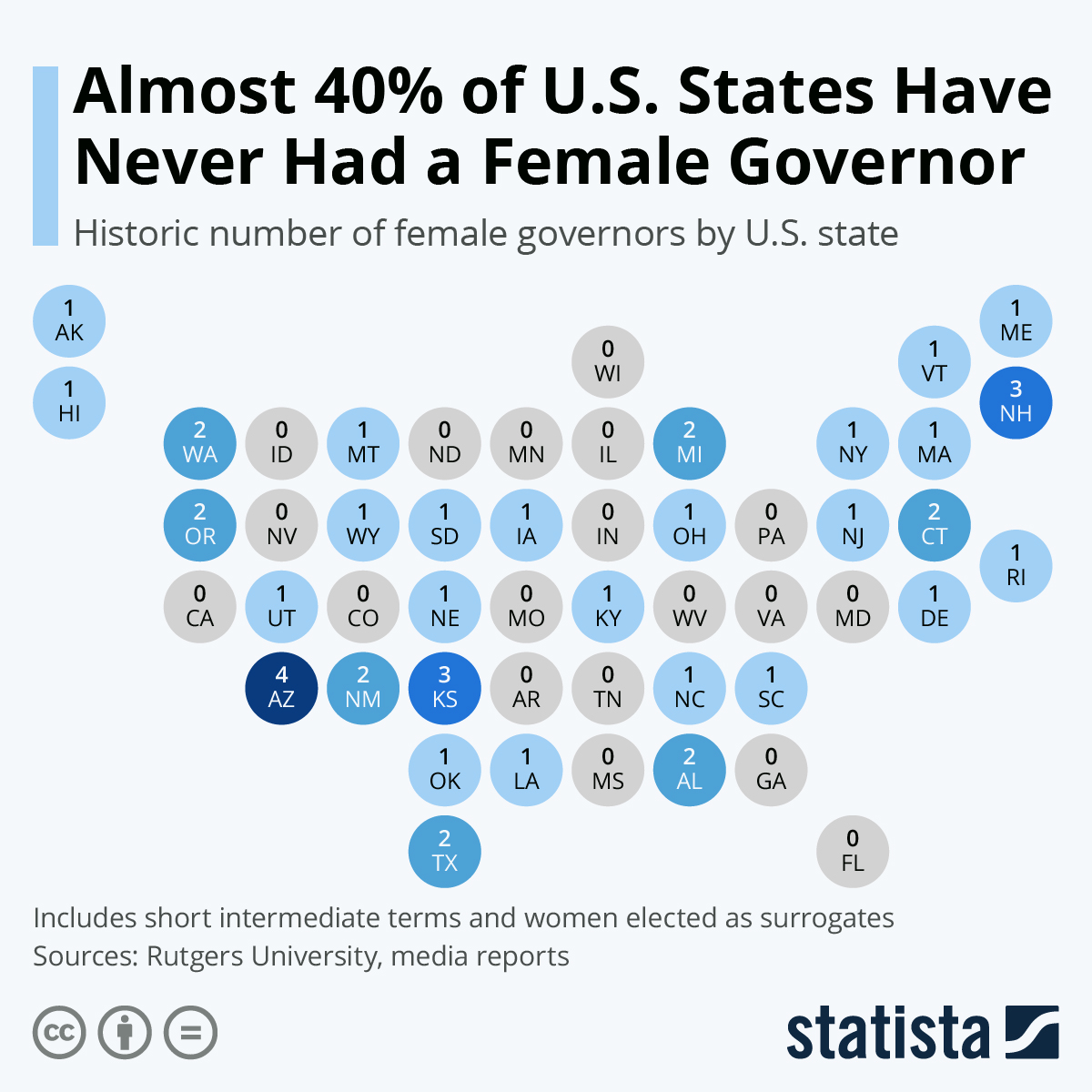
— Rep. Ron Kind, a conservative Democrat, says he won’t seek re-election. The announcement comes as Republicans gear up to win back his Wisconsin district that voted for Trump. Kind is one of seven Democrats sitting in a district that favored Trump last year, while nine Republicans represent districts that favored President Biden in 2020. Kind, 58, was a founding member of the New Democrat Coalition, an internal caucus that has long skewed toward more centrist economic policy in the mold of Bill Clinton’s presidency. He supported many trade agreements, including the 2015 fast-track authority that allowed the Obama administration to try to negotiate a Pacific Rim trade compact.
— Texas Supreme Court allows for arrest of Democrats who don’t show up at capitol. The Texas Supreme Court on Tuesday voided a lower court’s order that restricted Texas House Speaker Dade Phelan’s authorization to arrest and detain state Democrats who fled the state in July to block a GOP-backed voting overhaul bill. The high court issued a stay of Travis County State District Judge Brad Urrutia’s order, giving Democrats until Thursday to issue a court filing in response. Democrats, in response, said they would attempt to fight for a temporary injunction at the district court level. Unlike other states, which have rules that require a majority for a quorum to start a legislative session, Texas’ legislature requires a two-thirds super-majority. It is unclear exactly how many House Democrats have returned to Texas since 57 fled to Washington in mid-July.
— Dominion wages war on far-right news media over disinformation. The voting machine company that became a target of baseless conspiracy theories about the 2020 presidential vote is seeking $1.6 billion in damages in each defamation lawsuit filed against Newsmax, One America News and Patrick Byrne, the former CEO of Overstock. The company previously started proceedings against Fox News, Rudy Giuliani, the MyPillow chief executive Mike Lindell and the pro-Trump lawyer Sidney Powell. Meanwhile, Lindell said his website, Frank Speech, was hacked Tuesday morning, temporarily interrupting the livestream of his Cyber Symposium on how Chinese hackers defrauded the 2020 presidential election.
CONGRESS
— House to cut recess short, return Aug. 23 to take up infrastructure package. House Democratic leader Steny Hoyer said Tuesday that the House could cut its recess short and return in about two weeks to take up the sweeping $550 billion infrastructure bill that passed the Senate. "For your scheduling purposes, assuming that the Senate does, in fact, complete work on a budget resolution, the House will return to session on the evening of August 23 to consider that budget resolution and will remain in session until our business for the week is concluded," Hoyer, of Maryland, the House majority leader, said in a statement to colleagues. House members had been scheduled to return Sept. 20. House Speaker Nancy Pelosi (D-Calif.) has signaled that the bill will not get a House vote until the Senate passes a separate multitrillion-dollar package of safety net measures. Hoyer said in his letter that the House may take up other legislation, such as the voting rights bill named in honor of Rep. John Lewis (D-Ga.), the late civil rights icon.
OTHER ITEMS OF NOTE
— For the first time in the history of the U.S. census, the number of white people is expected to show a decline — a benchmark that's coming eight years earlier than projected, the Washington Post reports (link). The opioid epidemic, and lower-than-anticipated birthrates among millennials after the Great Recession, accelerated the white population decline, Brookings' William Frey told the WaPo.
— U.S. Postal Service is adding surcharges again on most packages shipped leading up during the holidays. Meanwhile, the U.S. Postal Service reported an expanded $3 billion quarterly loss as package volume dropped 14.1% from last year’s pandemic-affected quarter.

